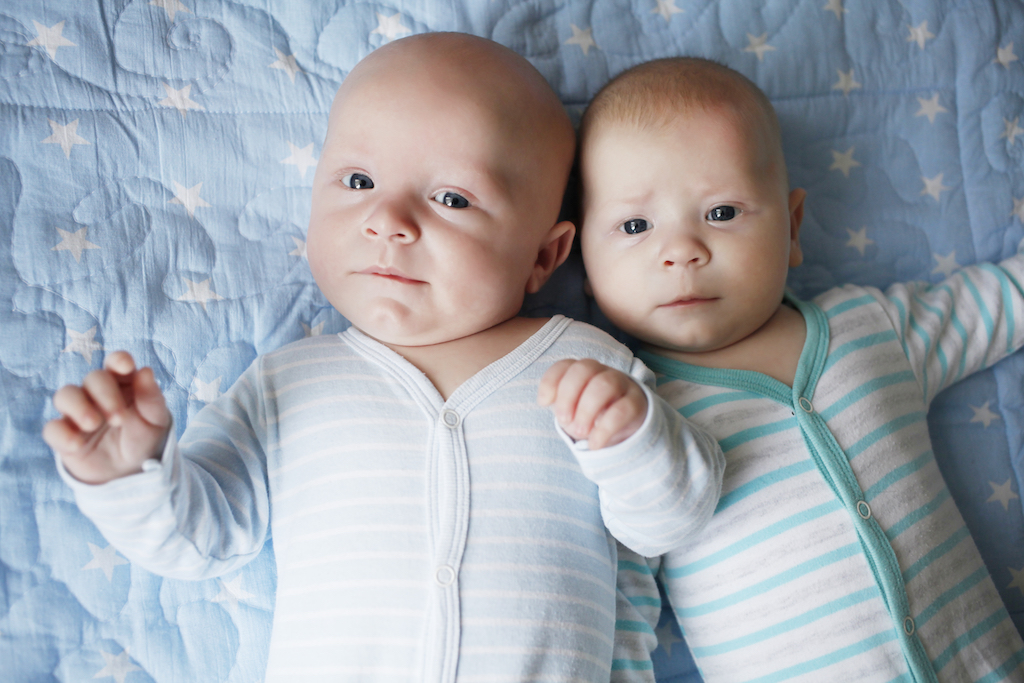Woman Gives Birth to Twins — 11 Weeks Apart
The chances of the pregnancy were 1 in 50 million.

When Lilliya Konovalova became pregnant with twins, she didn't expect to give birth twice. But the 29-year-old, who lives in Northern Kazakhstan, was in the hospital two times — once in May, for the birth of her daughter, and again earlier this month, for the birth of her son.
"My son was in no rush to come out into the world," Konovalova said, as reported by the Daily Mail.
The twins were born 11 weeks apart. Such a long interval between twins is rare, but not unheard of. (The world record — twins born 87 days apart — was set in 2012). But it's not just the separate birthdays that set these twins apart — it's the fact that each one gestated in a separate womb.
That's because Konovalova has a condition called uterus didelphys, which essentially means that she has a double uterus.
Related: Blossoming Body: 8 Odd Changes That Happen During Pregnancy
Uterus didelphys is surprisingly common — one in 2,000 women have it. The conditions occur early in development, when the two tubes that all female fetuses have, which normally fuse into one uterus, instead develop into two separate wombs. But the odds of a pregnancy like Konovalova's, where each baby develops in its own womb, are miniscule — just one in 50 million, Scientific American reported. (For a woman with uterus didelphys, the odds of conceiving one twin in each are 1 in 25,000).
Similar pregnancies have been documented. In 2009, a woman in Michigan with uterus didelphys delivered two baby girls, one from each side. In 2014, a woman in the United Kingdom with the same condition gave birth to triplets, two of whom shared a uterus, and one of which had its own.
Sign up for the Live Science daily newsletter now
Get the world’s most fascinating discoveries delivered straight to your inbox.
But in none of these documented cases were the babies born on separate occasions. That means Konovalova's pregnancy was rare on two counts.
Occasionally, after delivering one twin, a woman's contractions will subside. Sometimes, when the first-delivered twin is extremely premature, doctors will let the second fetus gestate in the mom's womb until it's closer to term, The Washington Post reported. That's what happened to Konovalova. When her daughter Liya was born, Konovalova was only 25 weeks into her pregnancy — barely past the threshold at which a baby can survive outside of its mother. By the time her son Maxim was born, he'd had much longer to develop inside the womb.
Konovalova and her twins are both healthy, and getting ready to leave the hospital as a family.
- 18 Ways Pregnancy Changes Your Body Forever
- Seeing Double: 8 Fascinating Facts About Twins
- 27 Oddest Medical Case Reports
Originally published on Live Science.

Isobel Whitcomb is a contributing writer for Live Science who covers the environment, animals and health. Her work has appeared in the New York Times, Fatherly, Atlas Obscura, Hakai Magazine and Scholastic's Science World Magazine. Isobel's roots are in science. She studied biology at Scripps College in Claremont, California, while working in two different labs and completing a fellowship at Crater Lake National Park. She completed her master's degree in journalism at NYU's Science, Health, and Environmental Reporting Program. She currently lives in Portland, Oregon.
Man gets sperm-making stem cell transplant in first-of-its-kind procedure
'Love hormone' oxytocin can pause pregnancy, animal study finds









